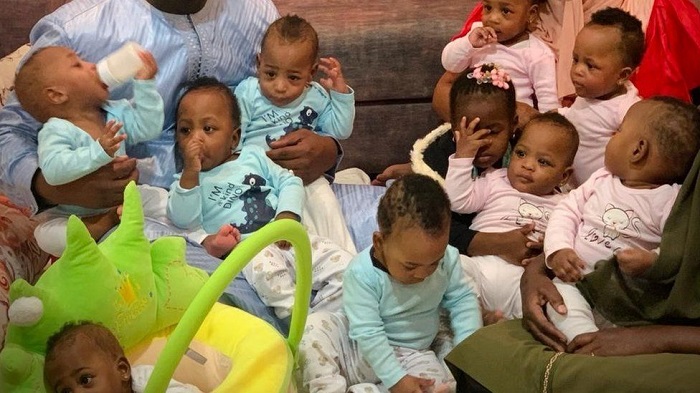
The world’s only nonuplets – nine babies born at the same time – are “in perfect health” as they celebrate their first birthday, their father has told the BBC.
“They’re all crawling now. Some are sitting up and can even walk if they hold on to something,” said Abdelkader Arby, an officer in the Malian army.
They were still in the care of the clinic in Morocco where they were born.
He said their mother, Halima Cissé, 26, was also doing well.
“It’s not easy but it’s great. Even if it’s tiring at times, when you look at all the babies in perfect health, (in a line) from right to left we’re relieved. We forget everything,” he told BBC Afrique.
He had just returned to Morocco for the first time in six months, along with their elder daughter, Souda, aged three.
“I’m overwhelmed to be reunited with all my family – my wife, the children and me.”
They will just have a small birthday celebration with the nurses and a few people from their apartment building, Mr Arby said.
“Nothing is better than the first year. We will remember this great moment we are going to experience.”
The babies broke the Guinness World Record for the most children delivered in a single birth to survive.
Ahead of the birth on May 4, 2021, Mrs Cissé was flown to Morocco by the Malian government for specialist care.
Multiple births were risky and mothers with more than four foetuses at a time were advised to terminate some in countries where abortion was legal.
There were also risks the babies could develop health problems due to their premature birth, such as sepsis and cerebral palsy.
Mrs Cissé and the children were currently living in what their father described as a “medicalised flat” that belongs to the owners of the Ain Borja clinic in Casablanca where the babies were born.
“There are nurses who are here, in addition to my wife, who help to take care of the children,” Mr Arby said.
“The clinic has given them a menu which says what to give them to eat at all times – night and day,” he continued. -BBC






